From Norman Tebbit’s infamous advice to the unemployed to get on their bikes to the Plebgate row, cycling has a long history of being embroiled in British political controversy and intrigue.
So it is not surprising that Jeremy Corbyn, perhaps Labour most divisive leader in recent history, has been accused of riding a Chairman Mao bicycle – a rumour he brushed off when discussing his love of cycling in an interview with the Tour de France winner and Olympic Gold medallist Sir Bradley Wiggins, who was guest-editing BBC Radio 4’s Today programme.
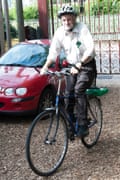
The Islington North MP, who took his aluminium-framed Raleigh bike along to his meeting with Wiggins, quipped: “The Chairman Mao bicycle is, you know those pigeon bikes that are very heavy with not many gears, weigh a ton and once you get them going they’ve got their own kinetic energy, but this one is actually a very light one so I think whoever wrote it was a Chairman Mao bicycle should be sent away for re-education.”
The opposition leader also drew a comparison between cycling and his political philosophy. “The parallel with sport is an interesting one because it’s half a parallel; because in sport, yes you’re in it, in the English tradition, to take part, but in reality you’re in it to win,” he said.
“Politics is slightly different in the sense that I am not that competitive a person – I am much more a community, cooperative kind of person.”
But for many other politicians of every hue the bicycle has become emblematic of the political race, with all its twists, turns and hazards.
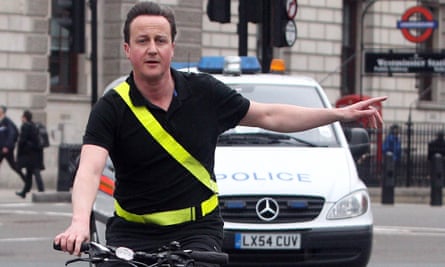
The likes of David Cameron and George Osborne have been keen to associate themselves with the sport, perhaps to convey a sense of vigour and vitality that might otherwise be unapparent to voters.
In 2006, Cameron, then leader of the opposition, said he cycled to work in Westminster on Wednesdays as it “gets me going” for prime minister’s questions. But his comments seemed like damage limitation, coming soon after he was mocked when it emerged that a car used to follow him carrying his shoes and briefcase.
Cameron’s former director of strategy at No 10, Steve Hilton, told the Today programme that he would support a political “cycle-off”. “I think everyone would love to see that,” he said.
But he said he would mark down the London mayor, Boris Johnson, if he competed in any cycling leadership race for wearing a suit on his bike.
“I think that was something definitely that ought to have been avoided because either it meant he was cycling too slowly to actually go anywhere to avoid getting hot and sweaty on his bike. Or in fact he did get hot and sweaty on his bike, which would have resulted in rather an unpleasant day for him and the people around him in the office.”
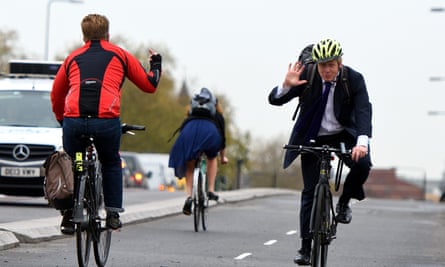
Johnson will no doubt be unconcerned. After all, he laughed off criticism from a fellow cyclist who gave him the finger as he opened the capital’s first cycling superhighway last month.
Hilton also revealed his irritation at being targeted by photographers on his daily ride to Downing Street. “Every single day ... it was the same picture, the same person on the same bike, going in exactly the same way perhaps in a slightly different scraggly T-shirt each time and I would say: ‘What’s interesting about this?’”
But he should consider himself lucky that his bike didn’t prove the downfall of his political career, unlike the former Tory chief whip Andrew Mitchell.
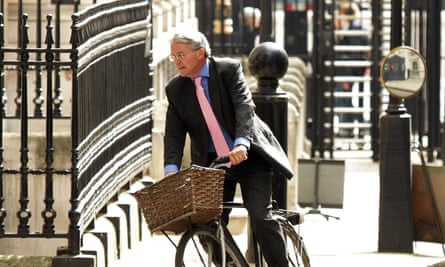
Mitchell was riding his 18-speed Reflex Westminster when a police officer refused to let him leave Downing Street via the main gate in September 2012. It was claimed at the time that the MP lost his temper and told PC Toby Rowland: “Best you learn your fucking place. You don’t run this fucking government. You’re fucking plebs.”
In March, Mitchell, who resigned as chief whip soon after the incident, paid out £80,000 in libel damages to Rowland after accusing the officer of lying. Mitchell was also ordered to pay £300,000 in costs to the Police Federation, representing Rowland, and the News Group Newspapers, for the Sun, and was also liable for the costs of the case, estimated to be in excess of £3m.
Mitchell was replaced as chief whip by Sir George Young, whom Hilton described as “the most famous cycling politician of recent years”. Young, who founded the parliamentary bicycle pool, earned the moniker the “bicycling baronet” when serving in the cabinet under Margaret Thatcher. He and his family were featured on a British Rail poster promoting the transport of bicycles by rail in 1982.
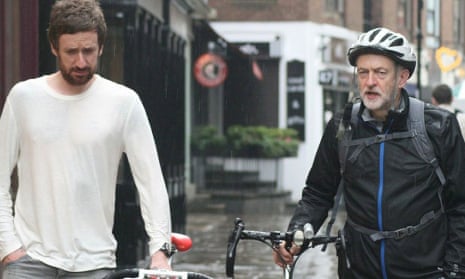
Comments (…)
Sign in or create your Guardian account to join the discussion